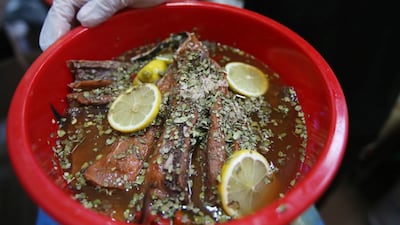ABU DHABI // Production of maleh, a traditional salted, spiced fish popular with Emiratis, is set to surge with the opening of a factory.
The Abu Dhabi Fishermen Cooperative Society (ADFCS) expects to open the factory next year, along with a facility for drying fish. It aims for production of maleh to rise to 100 tonnes a year from 10 tonnes currently.
“This year we will produce more than 10 tonnes of salted fish, but next year we plan to prepare about 100 tonnes,” said Ali Al Mansouri, president of ADFCS and the UAE Fishermen Cooperative Association.
He said the factories would address customers’ concerns about production hygiene and high prices.
ADFCS sells a pack of maleh that weighs between eight and 10 kilograms at Dh250, while the price could be as high as Dh400 in some markets.
“This a traditional food and we produce it hygienically with fresh fish,” said Mr Al Mansouri, adding that people were concerned that maleh were being made with fish that was four days old.
Mr Al Mansouri said there was a good market for salted and dry fish, with maleh mostly bought by Emiratis while dried fish are preferred by Filipinos.
“In every culture people love their traditional spices and food mixed with different kinds of oil and salt. Similarly, here in the UAE, locals love it,” he said.
“Our fathers and forefathers used to love the maleh and the traditions of consuming this has continued till this day because it’s very tasty.”
ADFCS also plans to open a fish-drying factory next year, as traditional open-air methods are regarded as unhygienic.
“The traditional methods of drying fish under direct sunlight is not healthy, as people leave them in open areas, which get contaminated with dirt, bacteria, insects and humidity,” said Mr Al Mansouri.
“But if you bring fresh fish and dry them using machines, you would get 100 per cent safe and hygienic fish to consume.”
Preparation of maleh takes about four months by leaving the fish in a box to absorb the spices, salt and oil.
With high demand and booming business, finding people to work in maleh production has not been a problem. “We have trained a number of young nationals on producing salted fish using the deep-rooted expertise and modern scientific knowledge, said Mr Al Mansouri.
“We succeeded in merging the past with the present and in passing on this profession, which constitutes a significant aspect of our Emirati heritage.”
The appeal of maleh has long been part of Emirati culture, said Saleh Abdullah, who was buying maleh at the fish market at the port.
“We love this with our food, as people love pickles with food. Not everybody can prepare this due to the specific spices used,” he said.
“Still, in the outskirts of the city you would find many locals preparing it at home.”
anwar@thenational.ae

